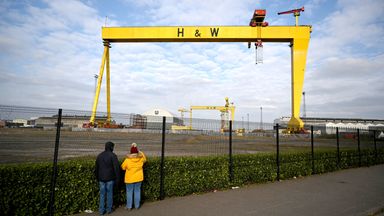Titanic builder Harland & Wolff set to collapse into administration
The company says between 50 and 60 jobs are to be lost immediately but insists a there is a “credible pathway to recovery” through a new owner taking over the business.

The iconic Belfast company that built the Titanic is to collapse into administration.
Harland & Wolff has announced it is insolvent and will appoint administrators.
An administration order will likely be made this week, it added.
The company said between 50 and 60 jobs are to be lost immediately, most of them based in London, but staff employed at its four shipyards are not affected.
Harland and Wolff has four shipyards – one in Belfast, two in Scotland (Methil on the Firth of Forth and Arnish on the Isle of Lewis) and one in England (Appledore in north Devon).
The union representing most members at two of the sites said its preferred option is a single buyer with a history of shipbuilding, rather than a private equity firm looking for a short-term profit.
“Workers, their families and whole communities now face their lives being thrown into chaos due to chronic failures in industrial strategy and corporate mismanagement,” the GMB union said.
Read more business news:
Money blog: Popular UK district plotting tourist tax
Big US interest rate cut in the balance
Why Rupert Murdoch and his children are fighting in court
The union called on the government to intervene and protect the four yards, saying they are needed “for our future sovereign capabilities” in sectors including renewables and shipbuilding.
It added: “The government must now act to ensure no private company is allowed to cherry pick what parts are retained, in terms of which yards or contracts they wish to save.”
A government spokesperson said the announcement will in no way affect jobs at Harland & Wolff shipyards or core operations such as delivering Ministry of Defence contracts.
“We are continuing to work extensively with all parties to find an outcome for Harland & Wolff that delivers shipbuilding and manufacturing in Belfast, Scotland and across the rest of the UK and protects jobs,” the spokesperson added.
It is the second time the business has been placed in administration in five years.
The announcement follows a full review of all group holdings which began in July.
Financial advisers were appointed to find potential investors or buyers of the business and “a number of parties” expressed an interest in “some or all” of the group’s activities, Harland & Wolff said.

Keep up with all the latest news from the UK and around the world by following Sky News
Discussion is also ongoing with “several parties” to secure interim funding by October for the business, the company said, adding: “There is a credible pathway to recovery for the group”.
Babcock International, the London-listed defence contractor, was revealed by Sky News to be weighing a possible bid for some of Harland and Wolff’s assets.
Navantia, the Spanish shipbuilder which has a joint contract with Harland and Wolff, is likely to be among the rival bidders.
“The group faces a very challenging time”, Harland and Wolff’s interim executive chair Russell Downs said.
“Good progress has been made to test the market for investor appetite, but this is likely to be via acquisition thereby reluctantly concluding that the plc listed vehicle’s own future will shortly come to an end.”
Harland & Wolff employs more than 1,500 people across its operations, including the main yard in Belfast.
It had been in talks with the Department for Business and Trade over support including a £200m export development guarantee, which was not given due to a “very substantial risk that taxpayer money would be lost”.
Be the first to get Breaking News
Install the Sky News app for free


A government spokesperson said: “We are clear that following a thorough review of the company’s financial situation, at present the market is best-placed to address these challenges, and providing government funding would have meant a significant risk of losing taxpayer money.”
Harland and Wolff has struggled for years due to strong competition, particularly from Asia.
Its shipyards were saved from closure in 2019 when it was bought out of administration for £6m by energy infrastructure firm InfraStrata.



